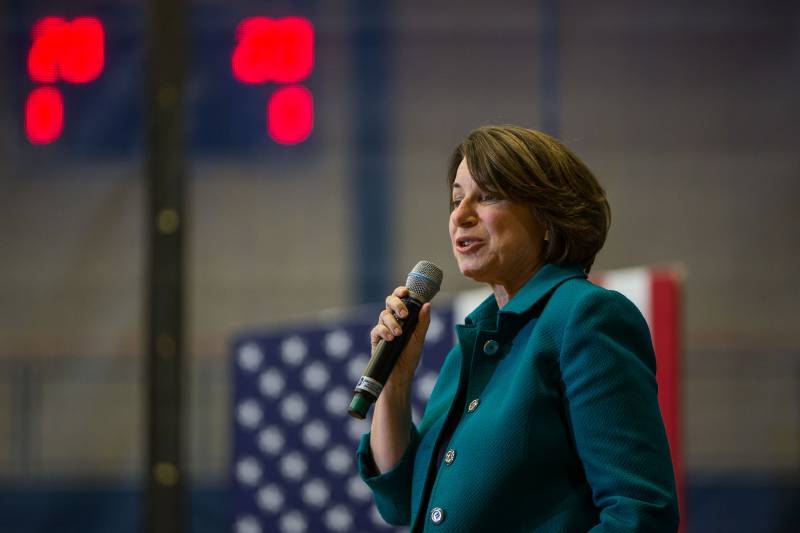‘The people are on our side when it comes to climate change. Why? Because like you and I, they believe in science.’
—Amy Klobuchar, February 2019
Been There

‘The people are on our side when it comes to climate change. Why? Because like you and I, they believe in science.’
—Amy Klobuchar, February 2019
Been There
Sen. Amy Klobuchar speaks of Fran, a woman she met in Pacific Junction, Iowa, along the Nebraska border during recent flooding. “Hanging there on her neck was this pair of binoculars. She had me look through them and she says, ‘This is my house, I bought it with my husband, our 4-year-old twins, we were going to retire in this house, and now it’s halfway underwater.'” It’s a personal connection, but is it enough to elevate the Minnesota senator above the other candidates?
Done That
Months into her first Senate term in 2007, Klobuchar introduced a bill to start a carbon-tracking program as a step toward a cap-and-trade system to address climate change. Another bill of hers called for an expansion of renewable energy tax credits, provisions of which later became law as part of the Emergency Economic Stabilization Act of 2008.
Getting Specific
• Klobuchar’s “Plan to Tackle the Climate Crisis,” released in September, stands out for its emphasis on using presidential powers to quickly restore climate and clean energy policies that the Trump administration has rolled back. She promises within her first 100 days to restore the Clean Power Plan to reduce power plant emissions; revive fuel economy standards for vehicles; strengthen enforcement of the Clean Air Act; and recommit the U.S. to the Paris climate agreement.
• Her climate plan sets a goal of net zero emissions by 2050, along the lines of what science says is needed to meet the Paris goals, though she provides fewer details than other candidates on how to get there. She proposes a $1 trillion energy infrastructure package and talks about using grants, tax credits and model building codes to encourage investment in clean energy and energy efficiency. She also mentions streamlining the permitting process for renewable energy production on federal land and investing in electric vehicle infrastructure, public transit and revitalizing rail transportation.
• While Klobuchar co-sponsored the Green New Deal resolution in Congress, she hasn’t embraced it in her climate plan. She has called it aspirational rather than prescriptive, telling CNN that it doesn’t make sense to “get rid of all these industries or do this in a few years,” while it does make sense to “start doing concrete things, and put some aspirations out there on climate change.”
• To help pay for energy infrastructure investments, Klobuchar says she would work with Congress to put a price on carbon pollution. Her plan doesn’t say what form that would take beyond stressing that it would not be regressive. She also proposes clean energy bonds to raise money and ending federal fossil fuel subsidies.
• She answered a Washington Post questionnaire on fracking by saying she doesn’t want to ban the method of extracting oil and gas, but would like to regulate it better. Her climate plan does, however, propose banning new fossil fuel permitting on federal land. She has said that “safe nuclear power” along with “cleaner coal technologies” should continue to be developed as part of a comprehensive energy strategy, according to an issue brief on her Senate website.
• She supports research into carbon capture and storage technology and co-sponsored a 2017 bill to expand a tax credit to help carbon capture research.
• In her climate plan, Klobuchar also talks about the importance of bringing science back into decision-making in Washington. She says she wants to “hold the fossil fuel industry accountable” for climate change and mentions working to get a constitutional amendment “to get dark money out of our politics.” She signed the No Fossil Fuel Funding pledge in May.
ICN’s Take
Klobuchar describes herself as a progressive who can still win moderate voters in swing states such as Iowa and Wisconsin. On climate issues, however, her tone and some of her positions mean that much of the Democratic field is to her left. She is a co-sponsor of the Green New Deal resolution but says it shouldn’t be taken literally, and she shies away from stances that could be branded as extreme, such as banning fracking. But she can argue that her actions on climate and the environment are progressive, as shown by her 96 percent lifetime rating from the League of Conservation Voters and her early support for a cap-and-trade program.
Read Amy Klobuchar’s climate platform.
InsideClimate News is a nonprofit, independent news organization that covers climate, energy and the environment. Sign up for the ICN newsletter here.

To learn more about how we use your information, please read our privacy policy.